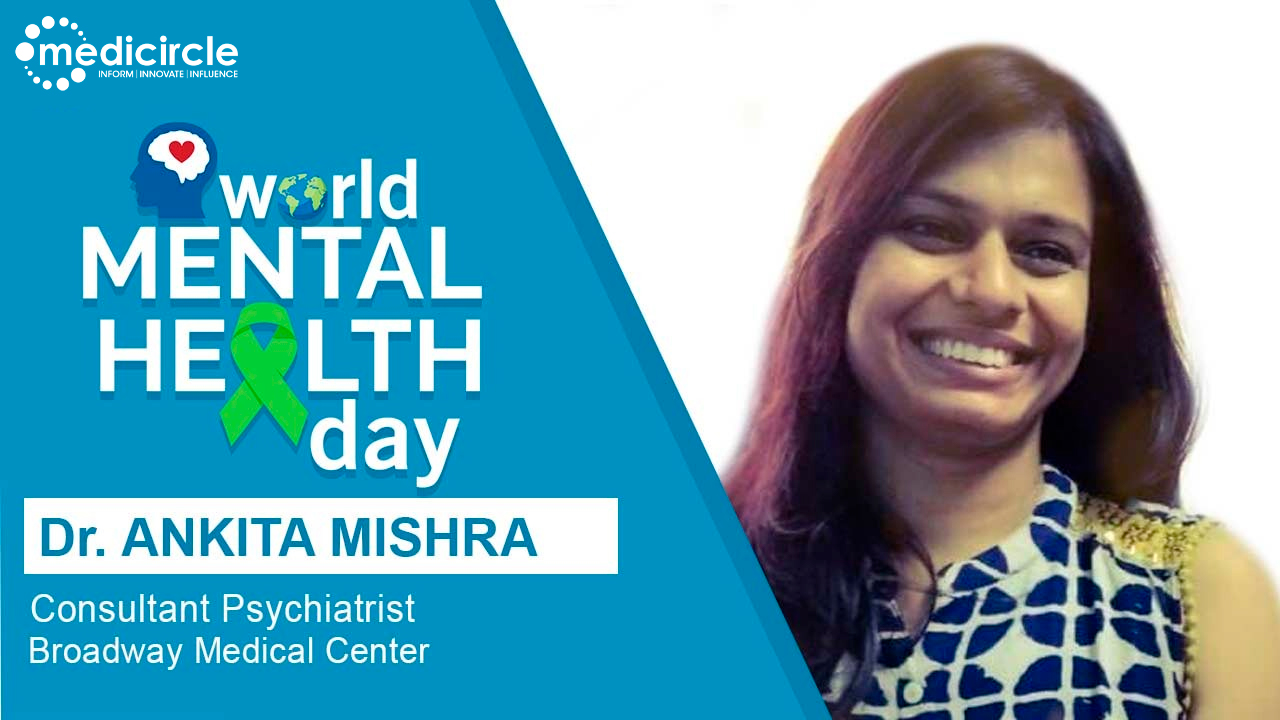Mental health matters because when we feel better, we do better. Mental health is important at every stage of our lives and impacts our thought, behaviors, and emotions. It plays an important part in maintaining healthy relationships and allows you to adapt to changes in your life and cope with adversity. World Mental Health Day (WMHD) is celebrated annually on 10 October, is organized by the World Federation for Mental Health, and endorsed by the World Health Organization (WHO). COVID-19 pandemic has a major impact on people’s mental health, therefore the need to observe this day becomes even more important. It’s important to talk about mental health, so others can also come forward about it. We at Medicircle are conducting World Mental Health Day Awareness Series to raise awareness about mental health issues that are currently affecting the world and ensure people enjoy good mental health and wellbeing.
Dr. Ankita Mishra is a consultant psychiatrist practicing in Broadway Medical Center, Mumbai. She has experience of over 10 years in the field of psychiatry. Her areas of interest are adult psychiatry, addiction psychiatry, mood disorders, and anxiety disorders. She is also a member of the Royal College of Psychiatrists, UK.
About Mental Health
Dr. Mishra begins, “When we speak about mental health, we are talking about our psychological and emotional wellbeing. A state of wellbeing is when the person can realize their abilities, cope with everyday stress, be productive and contribute our bit to society. Just like physical well-being, mental well-being is very important for our overall well-being. Good health without good mental health is not possible.”
PTSD
She explains, “PTSD or post-traumatic stress disorder is a type of mental health disorder. This is seen in people who have undergone traumatic events. Like natural disasters, accidents, injury, abuse or violence. The symptoms can last from a few months or many years. It contains intense emotional and physical responses. Some symptoms of PTSD are flashbacks, not feeling normal, and getting triggered by certain things that bring back the trauma. A person may feel restless and anxious making them hypervigilant. People with PTSD can also have certain symptoms of depression.”
She adds, “We are now seeing a similar problem called Post-COVID Stress Disorder. This is seen in people who had COVID infections and were admitted to the hospital. Or maybe someone they know had undergone a serious Covid infection. Apart from these, some people are susceptible to stressors and Covid created more stress for them. The reasons for stress for them could be isolation, unemployment, and financial losses. Here the symptoms are similar to PTSD. They have low moods, mood swings are high, anxiety, restlessness, loss of sleep and appetite.”
Solutions
She advises, “Firstly, talk to people who are close to you. Many times people don’t tell what they are going through to other people. Don’t let what others think, keep you down from speaking up. Find a trusted companion and speak to that person. Getting support from your loved ones can really help you. The next step is to consult a professional, get help from a psychologist or psychiatrist. Despite the growing numbers, there is still a stigma attached to mental health. People still think going to a psychiatrist means you are crazy. Instead of this, prioritize your mental health and consult a professional.”
Preventing Mental Health Problems
She mentions, “There is stigma related to mental illness and people think seeking help for the same is weakness. They think over time they will gain strength to tackle mental illness and don’t ask for professional help. Just like you visit a doctor when you get diabetes, similarly visit a psychologist or psychiatrist. It also helps if you can detect the early signs of mental illness. Loss of sleep, loss of appetite, mood swings, anxiety, and restlessness are signs of mental health problems.”
Adding, “Certain lifestyle habits must be a part of your life. Sleep on time and have a good diet. Also, control the amount of time you spend in front of your screen. Physical activities can also help. The most important thing is to develop a good social network. Research says that people with better social connections are healthier than people that don’t have good connections. Lastly, I’ll advise everyone to visit a professional mental health expert.”
(Edited by Priyal Shah)

 Learn about mental health disorders like PTSD and PCSD that are rising due to the pandemic from Dr Ankita Mishra. Know the prevention tips for mental illnesses.
Learn about mental health disorders like PTSD and PCSD that are rising due to the pandemic from Dr Ankita Mishra. Know the prevention tips for mental illnesses. 





.jpeg)

.jpeg)


_(1)_(1)_(1).jpeg)
.jpeg)
.jpeg)
_(1).jpeg)





.jpeg)


.jpeg)
.jpeg)
.jpeg)





.jpeg)
.jpeg)